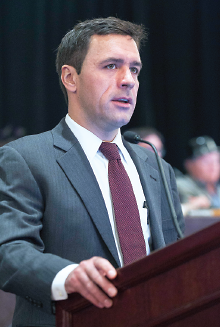If a nation’s greatness is measured by how it treats its weakest members, as Mahatma Gandhi once said, then the United States has a lot of soul searching to do, according to Paul Burton, M.D., chief psychiatrist at San Quentin Prison in California. “The number of people with mental illness incarcerated in jails and prisons has been increasing exponentially in the last generation, and this situation must be changed.” These vulnerable individuals need treatment for their mental illness under appropriate conditions, not simply warehoused and cut off from their communities, he said.
APA President Renȳe Binder, M.D., a forensic psychiatrist, is dedicating her presidential year to seeking solutions to end what she has called “this national tragedy,” and Burton was invited to address APA’s Assembly last month in follow up to a visit that the Board of Trustees had made to San Quentin last summer at Binder’s request.
Burton noted that San Quentin is the oldest prison in California, established in 1852; it also has the state’s only death row for male inmates, the largest in the United States. To help listeners understand the scope of the problem of the criminalization of people with mental illness, Burton reported that 2.2 million Americans are incarcerated, and of these, 350,000 to 500,000 have serious mental illness. Nationally there are 10 times more people with mental illness in jails and prisons than in state hospitals. That statistic is no coincidence: as the number of state psychiatric hospitals declined precipitously starting in the 1970s, the number of people imprisoned has risen proportionately. “Prisons and jails have become the 21st century state psychiatric hospitals,” he said.
Correctional institutions are in dire need of psychiatrists, and one of the messages that Burton brought to the Assembly is that practicing in a correctional setting is a rewarding career path to pursue. He noted that it is a “single-payer system,” which allows psychiatrists to spend more time providing clinical care instead of dealing with administrative overload. Also, psychiatrists in this setting are able to sharpen their diagnostic skills and can assess and treat a variety of mental illnesses, including those that are uncommon in the community such as paraphilias, psychopathy, and impulse control disorders. And for psychiatrists who have an interest in the intersection of psychiatry and the law, they can collaborate, educate, and learn from attorneys and law enforcement personnel.
But the most important reason that psychiatrists should consider a full- or part-time career in correctional psychiatry is “because that is where our patients are,” said Burton. “We must acknowledge that and work to change it.” ■

